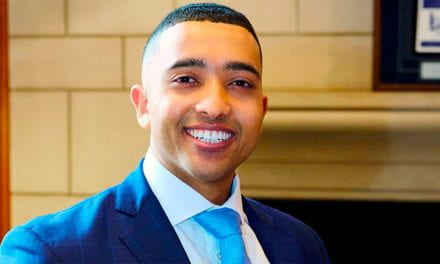Uma Moriarity is a 2014 graduate from the Smeal College of Business with bachelor of science degrees in finance and accounting. She also received a master’s degree in accounting by completing the integrated undergraduate/graduate degree program. She now works as the global environmental, social and governance (ESG) lead and investment strategy senior analyst at CenterSquare Investment Management.
Uma has appeared on numerous national media outlets like CNBC, Reuters and Bloomberg TV to share her expertise on investment strategy. She regularly volunteers with the Honors College as an alumni admissions interviewer and also serves on Smeal’s Sustainability Advisory Board.
Q: What about your experience at Penn State and Schreyer helped set you on a path to becoming a leader in the real estate investment industry with a focus on environmental, social, governance and sustainability (ESG) efforts?
A: First and foremost, Schreyer supported my intellectual curiosity. Asking questions and avoiding complacency are important parts of succeeding in any field, and that’s especially true across investment management. Investment managers must develop a view separate from the herd because that herd mentality is already priced into the market and will not yield any differentiated results. Those separate views are why clients pay us to manage their money instead of investing in something like an index ETF.
From an ESG perspective – I had to be resourceful and learn about those aspects of real estate myself because I was building these capabilities from the ground up at my firm. The people around me within the organization didn’t have such expertise and I had to develop them for myself. I had to ask questions, network with professionals who make it happen (architects, energy engineers, etc.), and build my knowledge. That allowed me to think about, for example, how a decision about the reflexivity of the roof we install on an industrial building impacts the heat island effect for the local community.
The second thing I would point to would be the skills I developed as a student leader at Penn State. I really loved being on mission-driven teams and having an impact on the organization and community around me. I’m passionate about sustainability and social justice, and when I found a way to combine that positive impact with the investment work I love to do, it was a perfect marriage. I’m fortunate that I was able to prove the value proposition for investing in real estate through an ESG lens at my firm and had the support of leadership to run with the concept.
Q: What was the title of your thesis and what was your main takeaway from that project?
A: The title of my thesis was “Earnings Manipulation and Predicting Stock Returns.” It was a great interdisciplinary exploration of accounting (identifying earnings manipulation through financial statement analysis) and finance (deploying that analysis to generate a factor that could help predict stock returns). The general framework – identifying data that can help uncover high-performing investment opportunities in the public markets – is something I still use in my job today.
Earnings manipulation is borne from poor governance policies and practices, and it leads to inferior stock performance. That was my biggest takeaway from the project, and I continue to apply that in my current role where I advocate for best-in-class governance practices at companies in which we invest.
Q: You volunteer on the Sustainability Advisory Board (SSAB) for Penn State’s Smeal College of Business and are working to incorporate sustainability into the curriculum of each major across the college. What skills or lessons from your time as a Schreyer Scholar helped you take on this work?
A: I’m the youngest person on the SSAB and it’s an incredibly helpful perspective. I was a student at Smeal not too long ago and I understand the needs of employers today where every company is trying to do more with ESG. The honors classes that I took at Smeal were very project-based and we were applying the concepts we were learning in real life.
In my FIN 301H class, my group developed a business plan for a local farm that they could then take to a bank to get funding for an anaerobic digestor on site. I took that class my first year and still think about it. This is the type of hands-on experience that is so important for learning sustainability concepts and how to apply them in today’s business environment where there is an urgent need for graduates to understand how to implement ESG concepts into their work.
Many businesses today are trying to understand and improve upon the environmental and social impact of their business. Also, regulatory requirements are forcing companies to report on their carbon emissions. So, it’s incredibly important to integrate concepts into the curriculum that will help prepare Penn State students to thrive in that world.
Q: You are a young professional who has taken on leadership roles and collaborates with colleagues older or more experienced than you. What lessons or wisdom from those experiences would you most like to share with Schreyer Scholars who could find themselves in similar situations?
A: It’s all about people. It’s so important to never forget that human aspect of whatever it is that you’re trying to do. You can’t be a leader if you don’t have any people to lead. Everyone has a unique perspective and has something to add to the conversation, you just have to be willing to listen and learn. Real estate, especially, is such a relationship-driven business. You must spend time building trust and maintaining that trust with people for them to see you as a leader or somebody they want to work with.
To hear more from Uma, listen to her interview on our Following the Gong podcast, which you can find on any of your favorite podcasting platforms.


